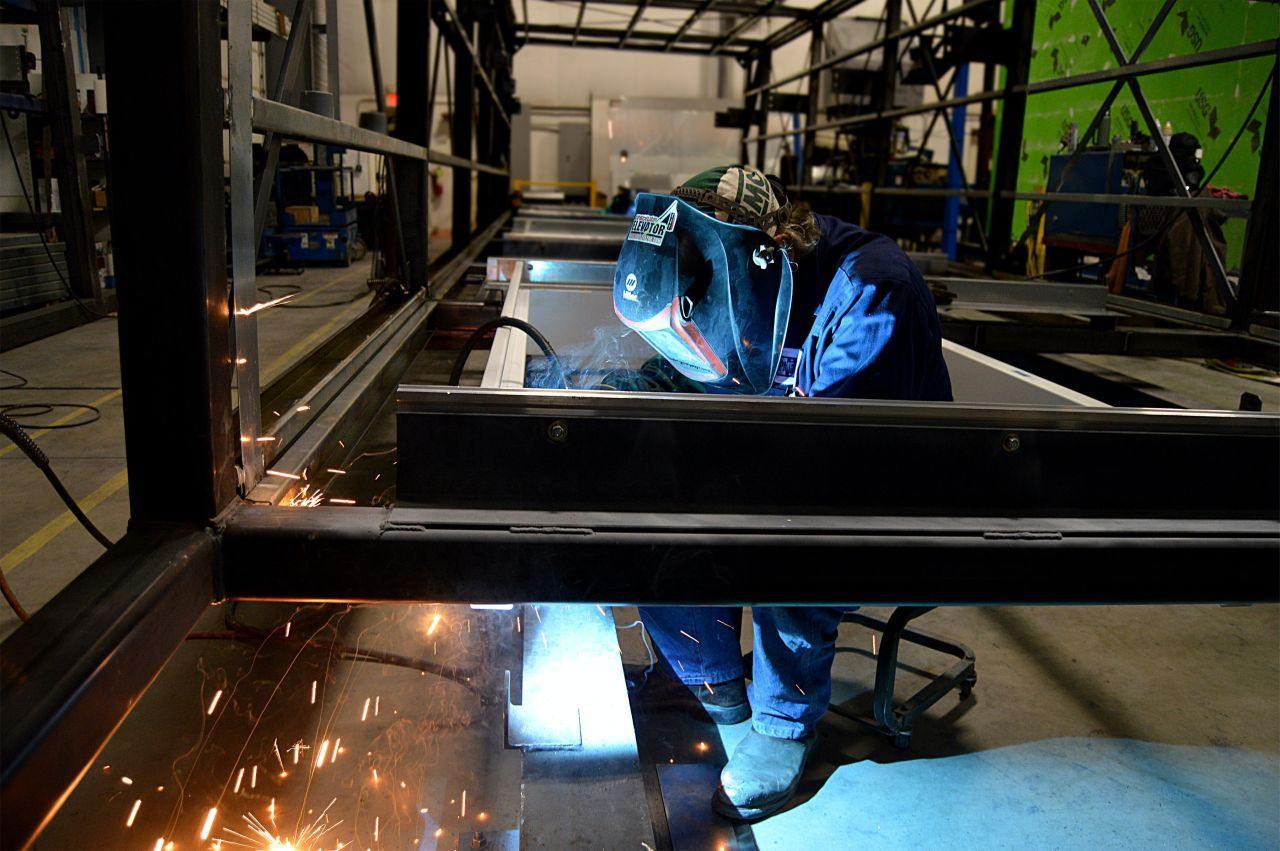The garage door you choose makes a huge difference to your home. It’s one of the first things people will notice about your home’s design, and a quality garage door immediately adds to the overall value of your home.
More importantly, it’s one of the most frequently used pieces of moving equipment in your home. It can completely throw off your day if your door suddenly doesn’t work or has other issues.
One of the most valuable additions to a garage door is insulation. Insulating a garage door can offer you many benefits. If you want a warm, energy-efficient home, you won’t want to pass on getting an insulated garage door.
For homeowners, garage doors tend to be the primary entrance into the home. With rooms usually surrounding the garage, it’s essential to keep the interior temperature controlled.
A well-insulated garage door will help regulate your garage temperature by keeping the interior cool in the summer and warm in the winter.
While many factors can impact the insulation of your garage, replacing your garage door can be the start to reducing the energy needed to keep your garage at a comfortable temperature.
Here are some tips to consider when choosing a thermally efficient garage door:
FAQs About Garage Renovation
What Is The Advantage Of An Insulated Garage Door?
Insulated garage doors tend to hold less heat than uninsulated doors. They also help maintain moderate temperatures just inside the door — where your opening mechanism is usually located. That means that these components aren’t exposed to such extreme conditions, which helps to prolong their lifespan.
What Is The R-Value Of An Insulated Garage Door?
Clopay garage door R-values depend on the door’s thickness, material and type of insulation and range from 6.3 to 20.4.
Will Insulating My Garage Door Keep It Cooler?
Insulation is just as important when it’s warm: If you use air conditioning or central air to cool your home, you want to keep the cold air from escaping outside. Insulated garage doors will help regulate your garage temperature and possibly the temperature of your house if you have an attached garage.
Is 6.5 R-Value Good For A Garage Door?
To get a decent R-Value: R-Values in the range of 6-8 are decent, respectable R-Values above non-insulated (R = 0) or wood (R = 2) doors.
How Thick Is An Insulated Garage Door?
The insulation is usually made from Styrofoam or polyurethane. The doors with Styrofoam insulation come in thicknesses of 1⅜”, 1¾” or 2” (35 to 51 mm). The doors with polyurethane insulation have a thickness between 1⅜” and 2” (35 and 51 mm). The vast majority of these doors are 1⅝” or 1¾” (41 or 45 mm) thick.
Two Types Of Insulation
An insulated garage door can significantly reduce the intrusion of street noise into the home – especially important when there are bedrooms or other living areas above or adjacent to the garage.
The type of insulation in your garage door can also make a difference. Many Wayne Dalton garage doors come with one of two types of insulation: polyurethane or polystyrene.
Polyurethane Foamed-In-Place Insulation
The same properties that improve thermal efficiency give polyurethane insulation excellent acoustic properties. Polyurethane is a foam that expands and bonds to surfaces when injected into the cavity.
Polyurethane insulation delivers twice the thermal performance of polystyrene insulation of the same thickness! It also adds strength and rigidity to the door panels and helps dampen sound transmission.
Our most popular polyurethane-insulated doors have R-values* ranging from 9 to 16.22. These doors are manufactured with polyurethane foamed-in-place insulation using a patented process.
The Wayne Dalton garage doors listed below have foamed-in-place polyurethane insulation:
- Carriage House Steel Garage Door Model 9700
- Carriage House Steel Garage Door Model 9405
- Classic Steel Garage Door Model 9100 / 9600
- Classic Steel Garage Door Model 8300 / 8500
- Designer Fiberglass Garage Door Model 9800 (up to 8ft)
- Specialty Vinyl Garage Door Model 8700
Expanded Polystyrene Insulation
Polystyrene insulation is rigid panels placed inside the door sections when manufactured. Polystyrene insulation is usually used in rigid sheets inserted into garage door cavities.
Expanded polystyrene insulation offers thermal efficiency with an R-value* between 3.7 and 7.4.
The garage doors listed below have Expanded polystyrene insulation.
The Importance Of R-Value
Whether you’re in the market for a new Wayne Dalton garage door or want to figure out the insulation of your garage door, consider measuring the R-value first. The effectiveness of the insulation is expressed as an R-value*, which is a measure of thermal resistance to heat flow.
The higher the R-value, the better the insulation in the door. Wayne Dalton always includes the R-value on all of our thermally efficient garage doors to help make your life a little bit easier!
How can you tell which doors provide the best insulation? In most cases, you’ll be comparing R-values, as they are currently the most common way to quantify insulation properties.
An R-value measures how effective a material is at insulating the garage door based on the amount of heat it loses. R-values are calculated with some factors, including chemical properties and the thickness of the insulation material. The higher a door’s R-value, the less heat that passes through it.
It’s important to note that the type of garage door insulation used affects the R-value independently of thickness. For example, a door with 2-inch thick polyurethane may have a different R-value than a door constructed with 2-inch thick polystyrene.
Types Of Insulated Garage Doors
Materials play a large role in how your garage door makes your home look. Fortunately, you have a wider selection of materials than ever before. Today, almost any door can come with insulation, regardless of the material. Garage doors typically come in three tiers of insulation based on their number of layers:
- Single-layer doors have one layer of one material and provide no other insulation.
- Double-layer doors have a layer of insulation in addition to the main material.
- Triple-layer doors have thicker insulation and an extra layer, making them the most efficient.
Be aware that choosing a single-layer door leaves you with only the insulation provided by the panel material, and no material by itself is an effective insulator.
By selecting a double or triple-layer garage door, the insulation material will do the heaviest lifting. You can pick a finish that suits your aesthetic desires rather than focusing on the material’s insulating properties.
So, how much do insulated garage doors cost? The price of an insulated garage door can vary greatly, depending on the material, size specifications, number of layers, model, finishing hardware and more.
To compare the various types of insulated garage door materials, you need first to understand the pros and cons of each. Here are some of the most common types of doors:
Aluminium Doors
Aluminium is the most lightweight material available for garage doors, providing the least insulating power. However, when combined with one or more insulation layers, aluminium doors can be affordable and better at keeping your garage at a proper temperature.
The Avante line-up of aluminium and glass doors is a popular way to update your home on a budget. It offers significant customisation in terms of colour and has options for glass windows to give your garage more natural lighting.
While this model does not offer insulation in the panels, you can opt for insulated glass panels to improve efficiency.
Steel Doors
Steel is the most common material you’ll find when searching for a new garage door. It has relatively low maintenance needs, comes in an immense variety of styles and is reasonably durable. Its insulation properties are moderate, but it’s easy to find multi-layer doors to increase efficiency. Here are some of the steel doors you’ll find in our collection:
- Modern Steel: These doors come in various looks and can be constructed as single, double or triple-layer doors. R-values on insulated Modern Steel doors range from 4.4 to 18.4.
- Gallery Collection: This exclusive collection of carriage house doors offers a vintage feel that works on various home styles and offers multiple insulation options that provide R-values of 6.3 to 18.4.
- Classic Collection Premium: If you prefer the simple look of a traditional raised-panel door, this collection delivers a range of design options to choose from. R-values range from 6.3 to 18.4.
Wood Doors
Homeowners typically choose wood doors for their classic upscale looks. Although wood alone does not provide great insulation, it is mostly used in high-end doors that offer double or triple layers. Clopay offers multiple wood options designed with insulation in mind:
- Modern Series: This collection blends contemporary with a classic in a four-layer construction with polystyrene insulation. The Modern series combines wood with an aluminium frame. The R-value of this series is 5.9.
- Limited Edition Series: This door series is made from sustainable sources for carriage house doors that give your home a warm, inviting look. This collection comes in both four or five-layer variations, also providing an R-value of 5.9.
- Custom Series: There’s nothing like bringing your very own design dream to life, and Clopay’s Custom series makes it possible. You can choose from gorgeous woods like African Mahogany, Spanish Cedar and Ironwood, all available in four or five-layer construction. Like other Clopay wood doors, the custom series offers an R-value of 5.9.
No matter what combination of qualities you’re looking for in a garage door, Clopay can make it happen.
Benefits Of Insulated Garage Doors
While you may not think an insulated garage door is a necessity, we are here to assure you that there are many benefits. Here are just a few benefits your insulated garage door can provide you.
- Comfortable environment: With proper insulation, your garage door can help regulate your garage temperature year-round. For example, if you live in a climate where the temperature is hot, this will help keep the interior much cooler.
- Prevents air leakage: As stated above, a well-insulated garage door can regulate the interior temperature. In addition, it also will prevent the hot or cold air from escaping through the garage door.
- Better resistance to dents: Insulation can provide an added layer of protection to help prevent dents, allowing you to enjoy years of a beautiful dent-free garage door.
- Reduces street noise: A noisy street can easily ruin a night at home. An insulated garage door can help reduce street noise from entering your home, and as a bonus, it can provide soundproofing benefits.
- Thermal efficiency: When your garage door and the surrounding walls in your garage are adequately insulated, you can achieve thermal efficiency, allowing your garage to maintain the proper temperature.
Other Tips and Tricks to Consider
- Air leakage: Large gaps between your garage door and walls can cause air to escape your garage, leaving even the most well-insulated doors useless for energy efficiency. Installing proper fitting seals, weatherstrips and hardware can help reduce energy loss. Our Wayne Dalton dealers can ensure professional-quality installation and limit the risk of air leakage.
- Windows: While windows on garage doors can be attractive, they can also be a source of energy loss. When considering windows, look for windows with low-emissivity coatings and glazes to decrease the potential for energy loss.
- Rooms and walls: Even if you have the most insulated garage door, if your garage walls are not well-insulated, it can impact the efficiency of your garage door. The same goes for the rooms above or surrounding your garage. If they are also not insulated, this can create a weakness for your garage.
When choosing a garage door, always consider what is best for you and your needs. Wayne Dalton garage doors have multiple thermal efficient garage doors with the listed R-value for each option to find the perfect one for your exact needs. By incorporating these tips, you will be able to increase your garage door’s insulation.
Enhanced Energy Efficiency
If you look for advice on how to conserve energy, you’ll typically find a long list of tips you can apply to the interior of your home. Many don’t consider the garage part of the home because it’s not typically used as a living space.
However, garages are commonly attached to the house and have conditioned rooms on the other sides of the walls. Therefore, the temperature conditions in the garage can spread to these other rooms and alter how hot or cool your home is, resulting in more energy usage.
A poorly insulated garage makes your house hotter in the summer and colder in the winter, increasing the burden on your HVAC system and raising the cost of your bills.
While proper insulation in the walls is important, it doesn’t do much good if the garage door isn’t insulated. An insulated garage door minimises temperature fluctuation from air leaks and gaps, keeping the pace steady.
But will an insulated garage door make a difference even if the rest of the garage isn’t insulated? Data from garage door manufacturer Clopay shows just how effective an insulated garage door can be — engineers measured the temperature of an uninsulated garage with outdoor temperatures of 20 degrees Fahrenheit.
With a single-layer uninsulated door, the garage was about 30°F. When they installed an insulated door, the garage was a much warmer 42 degrees Fahrenheit.
Improved Durability
When choosing a garage door, you want to select one that will last through the years without denting at the slightest impact. Single-layer garage doors offer little durability, while the layers used in the manufacture of insulated garages provide a much more rigid final product.
Today’s insulated garage doors start with an aluminium or steel frame filled with solid core insulation. This core then fits between steel panels, which can be made of a single or double layer. This type of manufacturing allows the door to remain lightweight but greatly increases its ability to withstand dents.
Older garage doors are frequently constructed with a single layer of thin steel applied to the frames. If there is no insulation, the interior of the door is essentially hollow and gives no resistance to impact from cars, bikes and balls.
Quieter Operation
Garage doors can be very noisy. If you’re used to it, you might not notice the clanging when the door opens and closes, but if you frequently use the door early in the morning or late at night, there’s a good chance your neighbours are aware of the sound.
Dampening noise by choosing an insulated garage door can increase the feeling of peace within your home.
Some noise issues can be solved by ensuring timely maintenance to lubricate hinges and springs and tighten loose track chains. However, a noisy garage door may result from the panels vibrating against the frame. In this case, the noise can’t be fixed by maintenance.
An insulated garage door is heavier and provides less room for panels to rattle against the frame, making it far less noisy than a non-insulated door.
Better Protection For Your Vehicles
The main purpose of most garages is to protect one or more vehicles from the elements. However, a garage without an insulated door can leave your car in freezing conditions.
Having trouble starting your car because it’s freezing can be a serious annoyance, but keeping a car in rare cold conditions can damage it over time. Some of the issues that can occur in cold weather include:
- Reduced battery life and dead batteries.
- Thickening of fluids for the transmission, brakes and engine.
- Low air pressure or flat tires.
- Reduced reliability of electrical systems.
Are our insulated garage doors worth it for the protection of your car? The results of the Clopay
experiment with insulated vs. non-insulated garage doors proves that an insulated door can keep a garage from harming your vehicles by protecting it from freezing temperatures.
More Living Space
Many people do more than park their car in the garage. Insulated garage doors will help you maximise the use of that space.
If you have a two-car garage and only one car, for example, there is likely ample space you could use for various activities. You could use the extra space to set up a home gym or a messy crafts project.
If you ever heat or cool your garage or want to use it as a living, working or play space, choosing an insulated door is a must, as it narrows the temperature range so that you can do more activities comfortably.
Money Savings
It pays to be energy-efficient. Switching to an insulated garage door can make a desirable difference in the energy bill you see every month. Why is this? It’s all about what the thermal boundary garages create, a sort of buffer against outdoor temperatures.
Most people air-condition and heat their homes, and some even do the same in their garages if they spend a lot of time in them.
The problem with non-insulated garages is that you’ll be waging a constant battle with the temperatures of Mother Nature as they slip through the gaps, driving up your electricity and gas bills immensely.
Leaks around the frame and windows and the thinness of aluminium doors are often the most significant causes of this kind of loss.
Conclusion
These days, garages serve many purposes in addition to storing vehicles. For many, the garage door is the primary way they leave and enter their homes. Some use their garages as a workshop, rec room or craft space, and most Americans use them for storage.
A second deep-freezer, some leftover paint cans and the family’s extra water jugs are other everyday items we store in our garages. Yet, sometimes people are surprised to learn that their things would be much better protected if their garage door was insulated.



